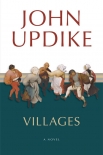Villages by John Updike (best summer reads of all time .TXT) 📗

- Author: John Updike
Book online «Villages by John Updike (best summer reads of all time .TXT) 📗». Author John Updike
Then, when he was thirteen, it didn’t. The mill where his father worked closed down. Its war work had been its last gasp. His father walked the baking summer streets of Alton looking for an accountant’s job. The humiliation of it wore his face thin and tinted it yellow. He became obsessed—absurdly, thought Owen, who never saw the bills—with the expense of the Mifflin Avenue house, the heating, the maintenance, the need for fresh paint. It had become in his mind another “rip-off joint.” He called it “Pop’s folly”; he had to get out from under it. The house, the only house Owen had ever lived in, was sold, for the very same amount, eight thousand five hundred dollars, for which Owen’s grandfather had bought it twenty-five years ago, in the wake of another world war. For half that amount they bought a house in the country, miles from anywhere, surrounded by eroding fields and the buzz of crickets and the scolding of birds. The little stone house had stood empty for a year. Swifts had built nests in the chimney; flying squirrels lived in the attic; feral cats hid in the old bales of hay in the unpainted barn. There was no electricity, no telephone, no plumbing, and putting in these things took much of their leftover four thousand dollars. Also, they had to have a car; in Willow they could walk everywhere, the five of them in five different directions if they wanted, and for seven cents the trolley car took them right into Alton, with its department stores and movie palaces. Daddy could not find a job in Alton. The entire city was slowly dying, and he, over forty, was too old to retrain. A college classmate in Norristown, toward Philadelphia, finally took him on, as an associate in his accounting firm, for less money than the hosiery mill had paid, and this took the car away from eight in the morning to six at night. Owen was left with his grandparents, his mother, a barnful of cats with runny eyes, and two fluffy collie puppies. The nearest neighbors were Mennonites, whose children had no time for play; they all worked on their farm. A mile away was an old tavern and a grocery store in a cluster of six houses along the road, but this was no kind of village. Owen stayed in the house and read science fiction and mystery novels set in English villages and dreamed of farfetched inventions that would make him rich. His retrospective image of his life tended to delete those years; they had no place on his résumé, the six rural years before he went away to MIT and New England.
The village he now lives in, his last village most likely save for the Bide-a-Wee Terminal Care Complex, has no government of its own; it is a precinct of a city of forty thousand, Cabot City. Haskells Crossing is the old summer-estate section, where the acreages of Pittsburgh and Chicago millionaires—billionaires in today’s money—have been broken into smaller holdings but are still remembered, still felt as a foundation layer of comfort and spaciousness. The great plutocrats, with their yachts and private docks and miles of granite wall and flaring stone staircases leading up to long swimming pools and neo-classic changing rooms and red-clay tennis courts and fanciful gazebos, left a certain aura as well as children who, themselves now nearing extinction, remember coming east from Chicago or Cleveland every June in Daddy’s private railroad car. A century before, as the B & M tracks came out from Boston along the North Shore, the crossing took its name from a local salt-water farmer, Enoch Haskell, who had been bought out; his weathered wooden buildings were knocked down and burned and his struggling fields turned into emerald lawns, but his name has outlasted those of those who ousted him. The South Shore lost its commuter lines after the war, but in this direction they hung on, and once an hour a passing train makes the granite bedrock underlying Owen and Julia’s house slightly but perceptibly tremble. He likes this elemental touch, this tangible connection between transport and geology.
There is a small downtown—the fire station, the war memorial, the French baker, a branch bank, a 7-Eleven, a fruit store, a health-food store, a drugstore eventually driven out of business by competition from the mall CVSs and Walgreens, a bookstore always on the verge of being extinguished by the Borders and the Barnes & Noble in the mall ten miles distant, a pizza parlor, a dry cleaner’s, two competing hairdressers both from the tropics (Costa Rica, the Philippines), a failing florist beside a vacant office that had housed a travel agency fatally undermined by the World Trade Center disaster and subsequent airline economics, a family restaurant, and a twice-as-expensive restaurant for courting couples and the local well-to-do when they have guests to impress. There is even a Haskells Crossing post office, from the days when the estate owners were deemed as deserving of one, at least, as a Nebraska whistle-stop.
But the ghostly center of power, which in Willow had been gathered at the five-cornered intersection, here hovers three miles and many railroad crossings away, at the city hall and adjoining police station, in the center of Cabot City. Once a riverside hamlet named Colchester after the home town of the early Puritan settlers, it was renamed in honor of the creator





Comments (0)